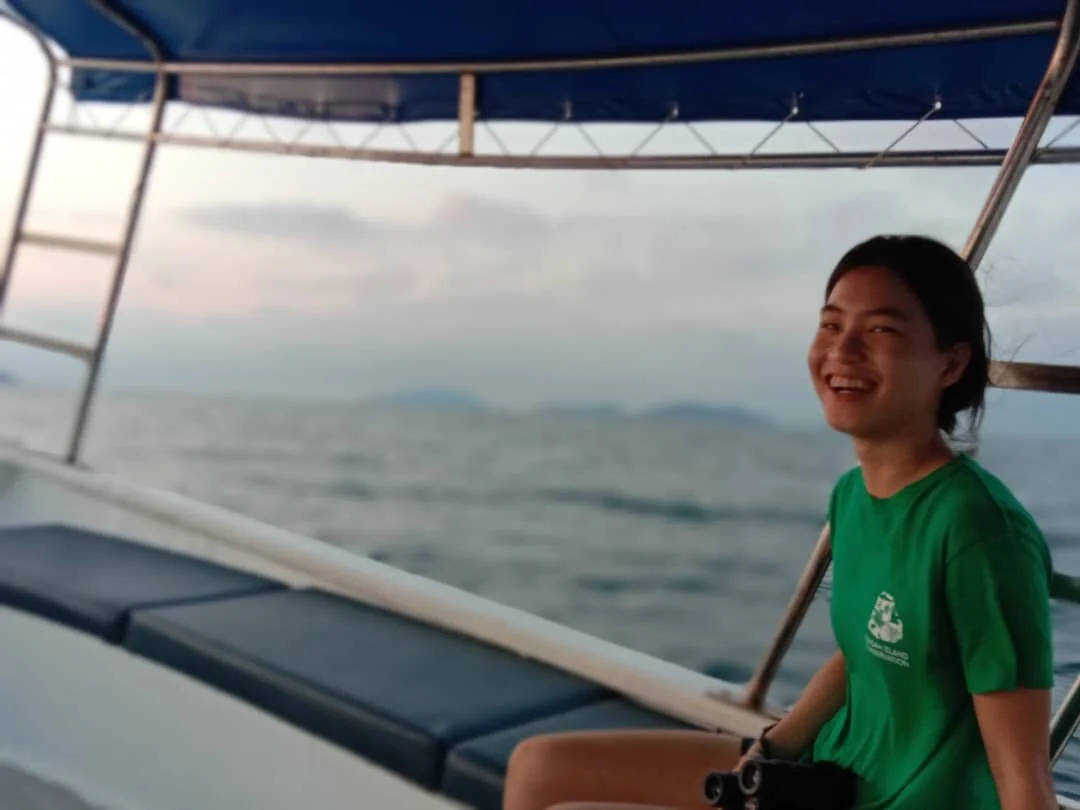Training to be a Field Assistant with TIC
My name is Lik and I am the new field assistant at TIC. I am here to share my experiences of what it is like to be a field assistant here at TIC. I was very excited when I first got the job offer from the Project Manager, scuba diving for work seems too good to be true! I also know that my job would be hard work and I would need to adapt to life on the island.
I arrived on the port of Tengah Island in Mersing and was greeted by very warm and welcoming group of people, this is where I met the rest of my team, Alberto, Alex and Alzam (Tanya was on the island). My first day of work started out with participating in the PEDAS event, where our outreach coordinator (Alzam) conduct lessons and activities focused on the marine environment and sea turtle conservation to local schools in Mersing. I was thrilled to see how enthusiastic and engaging the local students were and that TIC was responsible in raising awareness in turtle conservation in the local children at such a young age.
I arrived on Tengah island and was mesmerised with the beautiful turquoise water and white sandy beach.
PEDAS School Programme
Soon after the event, I arrived on Tengah island and was mesmerised with the beautiful turquoise water and white sandy beach. Usually in the mornings, I would start my day with boat patrol, where we look for turtle tracks on the Johor islands (Pulau Hujong, Harimau, Mensirip, Gual, Rawa and Besar) to collect data for turtle activity and to relocate the nests (if present) so that the eggs would be safe from predators and poachers. I remembered the sea was very rough (due to the monsoon) on the first day of boat patrol and I was not having a good time looking through with the binoculars. The seasickness got better overtime, eventually it felt as it I was on a rocking chair. They say the more you do it the easier it gets.
On some days, we would find turtle tracks and this is my chance to identify the species of turtle and the find the egg chamber (if present). Alberto is very good at explaining and finding the nest (and making fake turtle nest for training), which has improved my confidence and skills to find those nests.
The favourite part of my job is to be in the water conducting fish and coral identification training for conducting surveys in the various reefs. I normally do my dives with Alex or Alberto and they would let me know if I got it right. It was fun and rewarding to be able to identify species correctly and I find myself learning to identify species faster than when I was learning in university. This activity allows us to survey the abundance and species of coral and fish in the various islands and the survey data would then be used to monitor the state and health of our reefs which is an important part of our conservation work. On some days we would have amazing visibility, so much so that I forgot I am underwater! The dive sites were covered with a high coral coverage and I can never get bored looking at the fish and their interesting behaviours. Occasionally we would be lucky to spot something interesting like cuttlefish or a turtle!
As part of my training to be a field assistant, I had to learn all of the conservation projects that TIC were involved and assist volunteers training. That includes mangrove rehabilitation, bat surveys, small mammal survey on the island, participate in beach clean-up with resort’s guests and learning to give out talks to the resort’s guests. On some days I would feel overwhelmed with information, but my colleagues had been very patient at explaining and making sure that I understood the information and expectations of my role. After work, we would have a drink together and enjoy the beautiful sunset on the island. It was not difficult for me to settle down and adapt to the life on the island, the only downside was the overly friendly mosquitos.
Overall, I have enjoyed my time working with TIC although it was way too short, and I was still looking forward to learning so much more. We were told that due to the restricted movement order from the Malaysian government for COVID-19, the resort had to close it’s premises and that we had to stop with our conservation work. For now, we are doing what we can to get back to work when the situation allows. Dear future volunteers, I would very much hope to meet with you guys and teaching you the fun and meaningful conservation work we are doing here!











